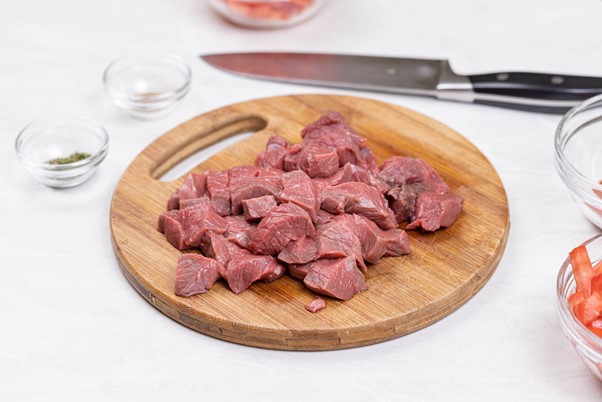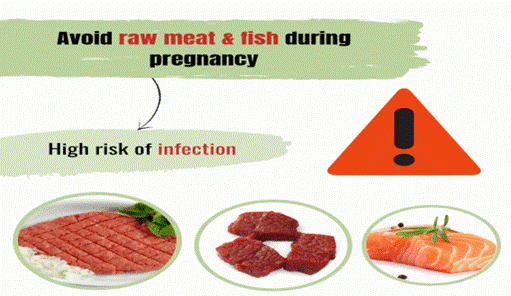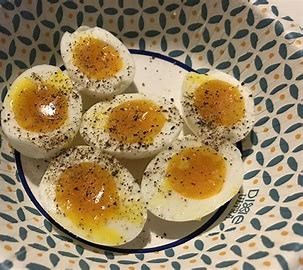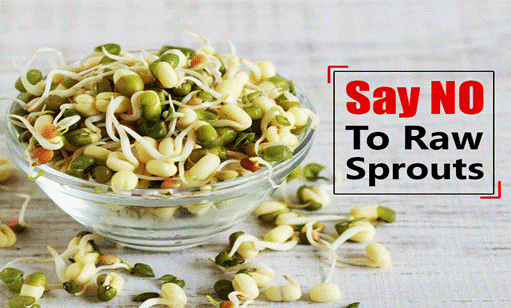A lot of pregnant women don’t know that there are foods to avoid during pregnancy.
There are many foods and drinks to avoid during pregnancy, such as undercooked meat, unpasteurized milk, soft cheese such as brie, deli meat, energy drinks, raw eggs, raw egg sauces, etc., to avoid serious health problems for you and your baby, which could result in food poisoning, uterine cramps, premature birth, low birth weight, or stillbirth.
A varied, balanced diet is advised for every person, but during pregnancy and depending on your health condition, you must eat what’s right for you and your baby.
Pregnant women should make sure that what they eat is steaming hot to kill bacteria that may be found in food.
Find below our list of 12 foods to avoid during pregnancy:
Avoid raw or undercooked meat

The most important thing is to avoid raw or undercooked meat, which increases your risk of getting contaminated by bacteria or parasites, including Toxoplasma, E. coli, Listeria, and Salmonella. Infected undercooked or raw meat may be asymptomatic in non-pregnant women, but it may result in stillbirth or miscarriage during pregnancy.
Cook all meat sources, and while ordering, always order well-cooked meat. Make sure that all types of meat have no trace of blood. Take care when eating poultry, pork, sausages, burgers, hot dogs, lunch meat, and deli meat, as they may be cross-contaminated during processing or storage or not well cooked, leading to food poisoning.
Deli meat can be fresh or precooked. It can be made from turkey, pork, chicken, or a mix of different kinds of meat. A lot of additives, spices, and flavors are added to deli meat.
Avoid eating undercooked meat at restaurants in sandwiches and other dishes, especially deli meat sandwiches. Many people may forget about it. Don’t forget to specify that you don’t want undercooked meat.
During pregnancy, avoid processed meat unless it is extremely hot, such as deli meat.
Many undercooked meats may cause food poisoning due to possible cross-contamination. During pregnancy, food poisoning may lead to stillbirth, miscarriage, etc..
Try to heat all leftovers until they are steaming hot to avoid any contamination.
Game meat: is the meat of animals shot with lead bullets, and this lead may contaminate the meat. So make sure to know the source of the meat you are eating.
Avoid internal organs

Internal organs, such as animal liver, are high in vitamin A, another food to avoid. You can eat it occasionally, but make sure not to eat undercooked or raw meat, and when reheated, make sure it is steaming hot to avoid possible food poisoning.
Vitamin A (even vitamin A supplements) can cause congenital malformations and miscarriage if consumed during pregnancy, so watch what you eat, especially in the first trimester, as recommended by the American College of Obstetrics and Gynaecology.
Avoid high mercury fish
Fish and other kinds of seafood have a lot of benefits for you as well as for your baby’s well-being. However, pregnant women must avoid some fish and shellfish that contain high mercury levels. Bigger fish usually eat the smaller ones, causing mercury to accumulate in the larger ones and pass easily from you to your baby. It can be dangerous for a baby’s developing nervous system.

Avoid fish with high mercury levels, such as bigeye tuna, king mackerel, marlin, orange roughy, shark, swordfish, or tilefish, as recommended by the American College of Obstetrics and Gynaecology.
Fish have lower mercury levels, and you have to reduce their consumption: cod, salmon, haddock, etc.
Limit albacore tuna as recommended by the American College of Obstetrics and Gynaecology.
Avoid raw seafood

Avoid undercooked or raw meat (shellfish and fish) like mussels, oysters, mussels, etc. Shellfish and all fish types (smoked fish) must be well cooked until their meat color becomes white. When cooking smoked fish at home, cook them thoroughly until steaming hot.
Most sushi dishes are composed of raw meat, so it is better to avoid them. After pregnancy, you can eat whatever you love.
Avoid raw eggs

Avoid eating raw eggs during pregnancy and cook them until the white and yolk solidify. Raw egg dressings, such as Caesar dressing, mayonnaise, and homemade ice cream and custard, should be avoided during this sensitive period because they may contain harmful bacteria like salmonella, which can cause food poisoning (fever, nausea, vomiting, stomach cramps, and diarrhea).
Make your sauce using a raw egg substitute.
Avoid unpasteurized milk

Don’t drink raw milk (unpasteurized milk) or eat food that is made from it, such as soft goat’s cheese.
Unpasteurized milk is milk that doesn’t undergo any treatment or heating to kill bacteria.
It is advised that you ask if the food you ordered contains unpasteurized milk or not.
Cheese is considered safe if it is made from pasteurised milk, according to the Centers for Disease Control and Prevention.
Avoid soft cheese
It’s best to avoid soft cheeses (because they are made of unpasteurized milk), as they are considered good media for bacteria growth, such as Brie, Camembert, Roquefort, Feta, Gorgonzola, and Mexican-style cheeses (Quéso Blanco and Queso Fresco). Cheese is considered safe if it is made from pasteurised milk, according to the Centres for Disease Control and Prevention.
Raw sprouts

Raw sprouts may be contaminated with harmful bacteria. Due to the humid environment required for seeds to start sprouting, these kinds of bacteria can grow there easily.
When they are strong and edible, alfalfa, clover, radish, and mung bean sprouts all have a white stalk.
You can make your own alfalfa, clover, radish, and mung bean sprouts, but the risk of getting them contaminated can never be eliminated. Cooking them or avoiding them while pregnant is preferable.
Avoid fresh juice

Fresh fruit and vegetable juice in restaurants, juice bars, or farm stands may not have been pasteurised, so they may contain harmful bacteria.
Make sure to clean the soil found on fruits and vegetables to remove potential bacterial contamination.
Avoid caffeine

Caffeine is transferred directly from the mother to the baby via the placenta. Consuming a lot of caffeine may increase the rate of miscarriage or low birth weight. Caffeine is naturally found in coffee, tea, and chocolate and is added to some soft drinks and energy drinks.
Energy drinks such as Red Bull and many others have a lot of ingredients, such as caffeine. Consider avoiding energy drinks during pregnancy, as they can pass through your placenta and affect your baby.
Soft drinks contain caffeine, the same as energy drinks, but in different quantities; energy drinks may also contain ginseng and other energetic ingredients that are supposed to give you energy, but too much of them may affect your heart as well.
Avoid Alcohol

Drinking alcohol during pregnancy can also cause fetal alcohol syndrome, which involves facial deformities, heart defects, low birth weight, and intellectual disability.
Birth weight varied from race to race and from woman to woman. The average birth weight depends on age and health conditions.
Weight gain
Pregnant women must follow their weight gain, and other health conditions must be kept in mind.
Being undernourished will affect you and your baby’s health. It will decrease your body’s needs and may lead to low birth weight or premature labor. You must mind your eating habits and make sure your body is properly nourished.
Avoid sugary and fried foods; they will have long and short-term adverse effects, causing gestational diabetes, an increase in cholesterol levels, and further heart problems. Healthy substitutes should always be considered, as mentioned earlier, starting before pregnancy preparations and during pregnancy.
According to the Centers for Disease Control and Prevention, pregnant women should wash their hands thoroughly before and after handling or cooking raw meat or handling pet waste, as well as washing all surfaces and utensils that come into contact with the meat.
You (as a pregnant woman) have more foods to eat than foods and drinks to avoid during pregnancy. You just have to learn how to choose what suits you and your current situation. You’ll want to pay close attention to what you eat and drink to stay healthy during this precious moment.
